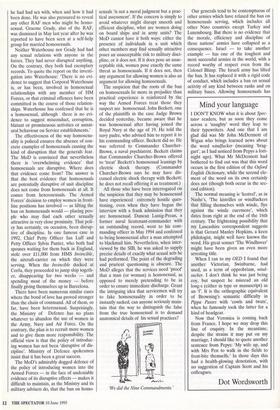Mind your language
I DON'T KNOW what it is about Spec- tator readers, but as soon they come across a 'naughty' word they leap to their typewriters. And one that I am glad did was Mr John McDermott of Wigan who brings learned news about the word windfucker (meaning 'brag- gart', as I had noticed from Pepys a fort- night ago). What Mr McDermott had bothered to find out was that this word occurs in the first edition of the Oxford English Dictionary, while the second ele- ment of the word on its own certainly does not (though both occur in the sec- ond edition).
The normal meaning is 'kestrel', as in Nashe's, 'The kistrilles or windfuckers that filling themselves with winde, flye against the winde euermore', which dates from right at the end of the 16th century. The frightening possibility that my Lancashire correspondent suggests is that Gerard Manley Hopkins, a keen philologist, might well have known the word. His great sonnet 'The Windhover' might have been given an even more arresting title.
When I ran to my OED I found that another Victorian, Swinbume, had used, as a term of opprobrium, wind- sucker. I don't think he was just being coy, but suspect he misread an old long-s (either in type or manuscript) as an T. It is the orthographic equivalent of Browning's semantic difficulty in Pippo Passes with 'cowls and twats', when he famously took the latter for a kind of headgear.
Now that Veronica is coming back from France, I hope we may drop this line of enquiry. In the meantime, despite the strains it may put on my marriage, I should like to quote another sentence from Pepys: 'My wife up, and with Mrs Pen to walk in the fields to frost-bite themselfs.' In those days this had a health-glowing denotation, with no suggestion of Captain Scott and his colleagues.
Dot Wordsworth


































































 Previous page
Previous page